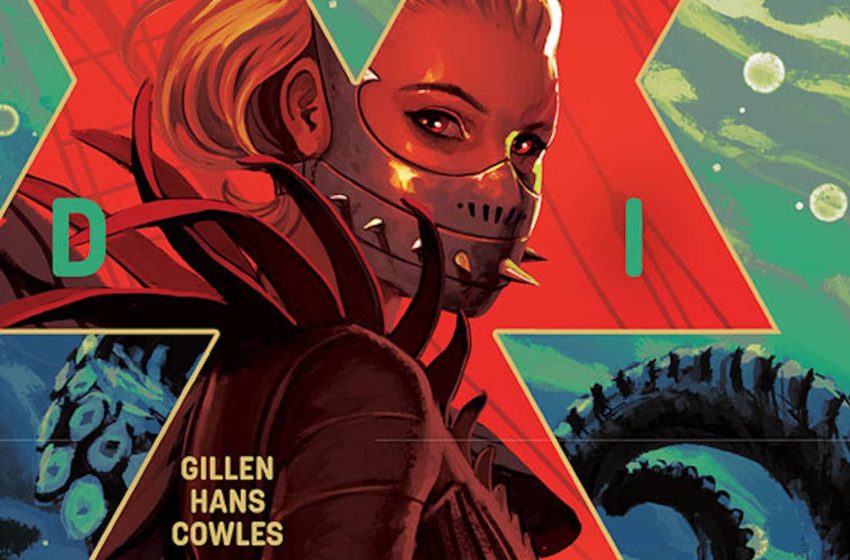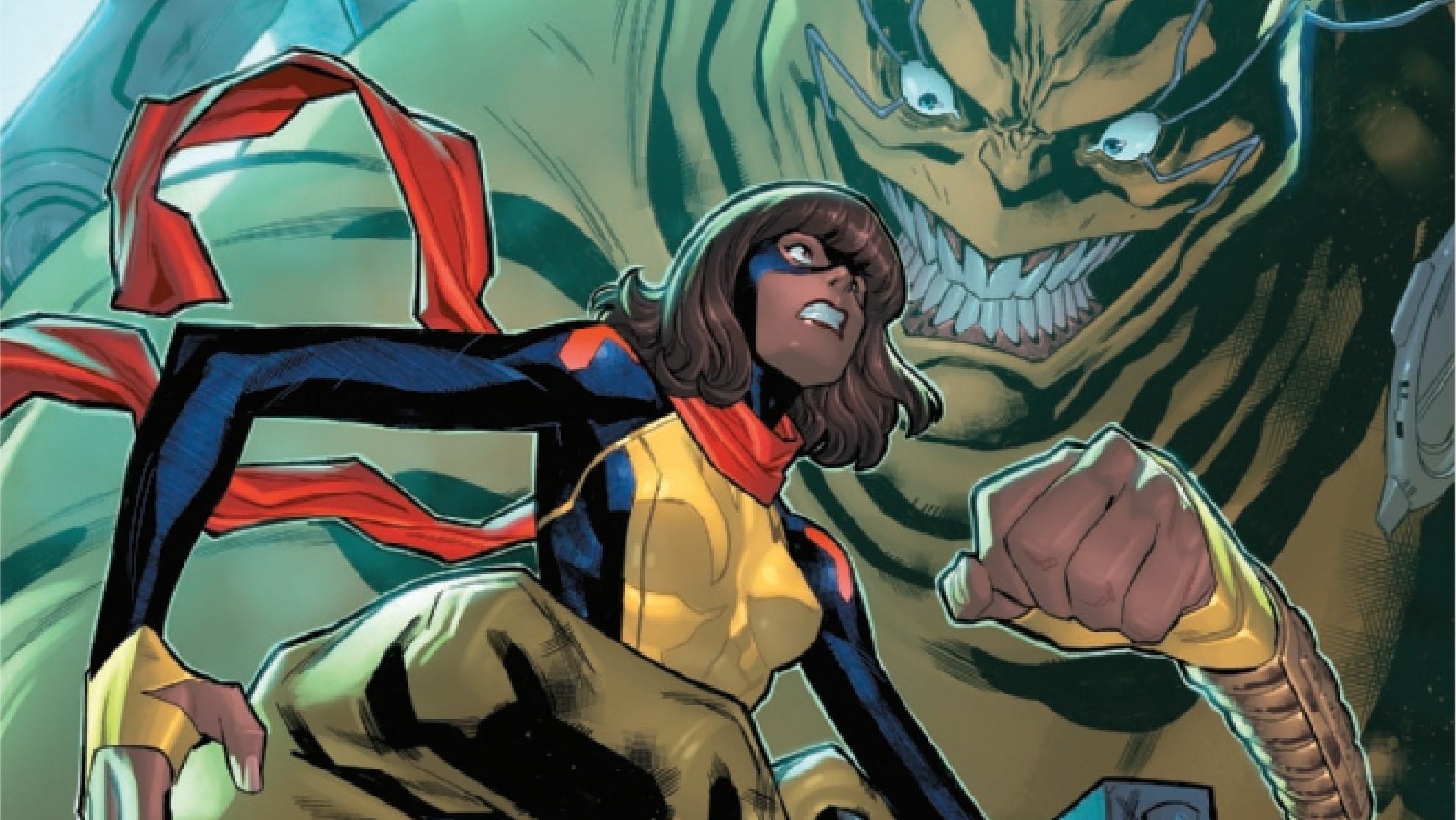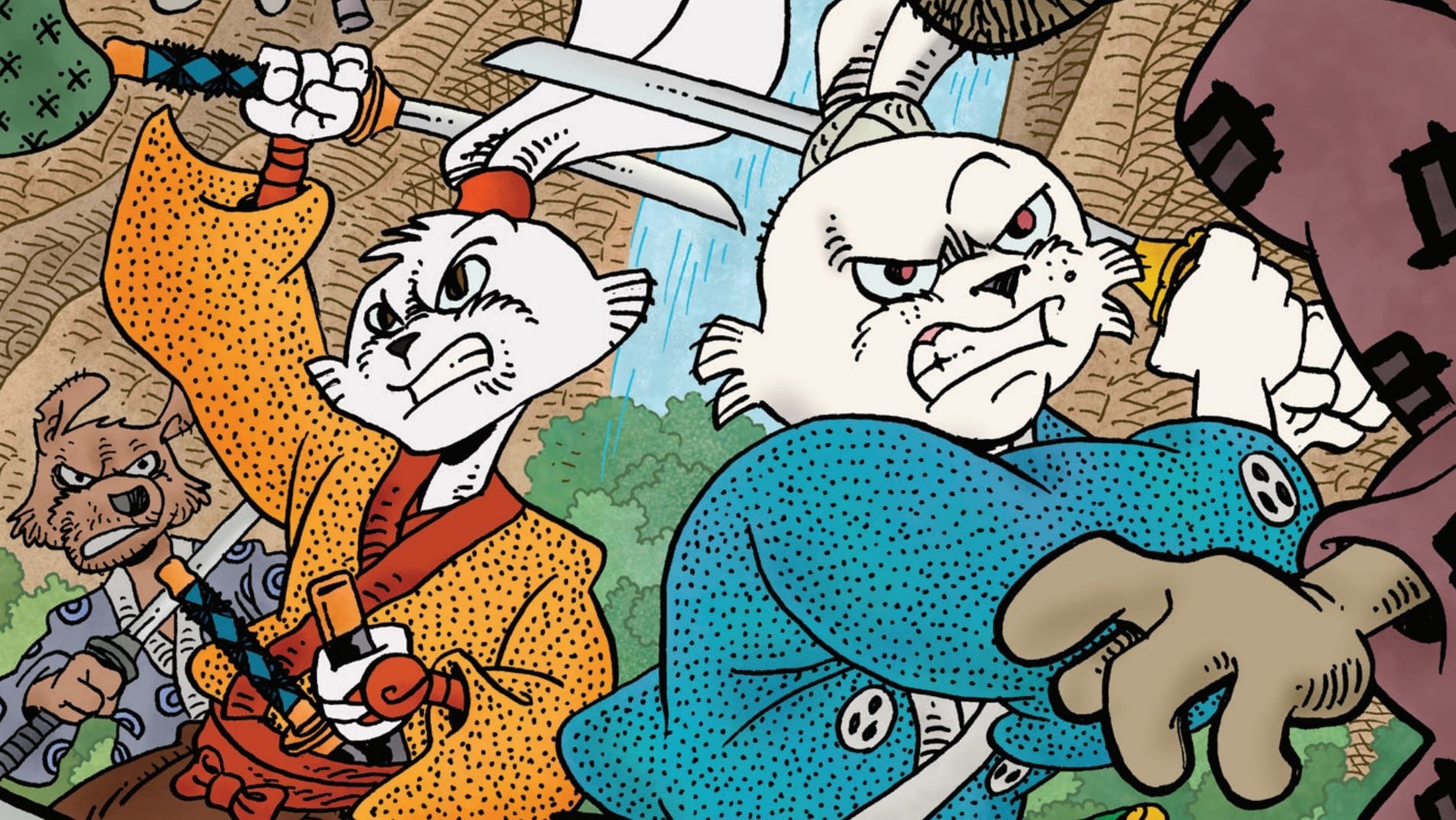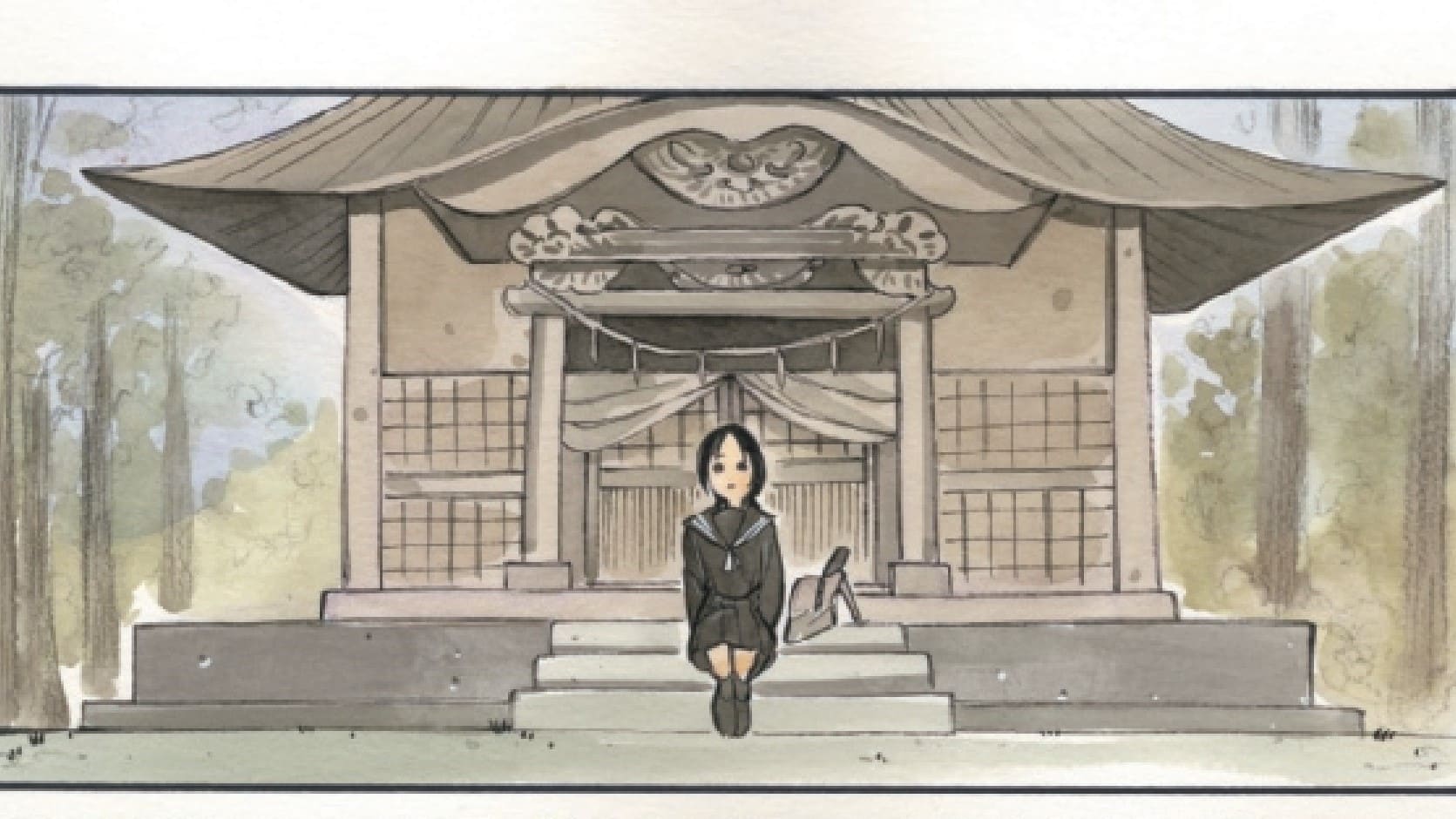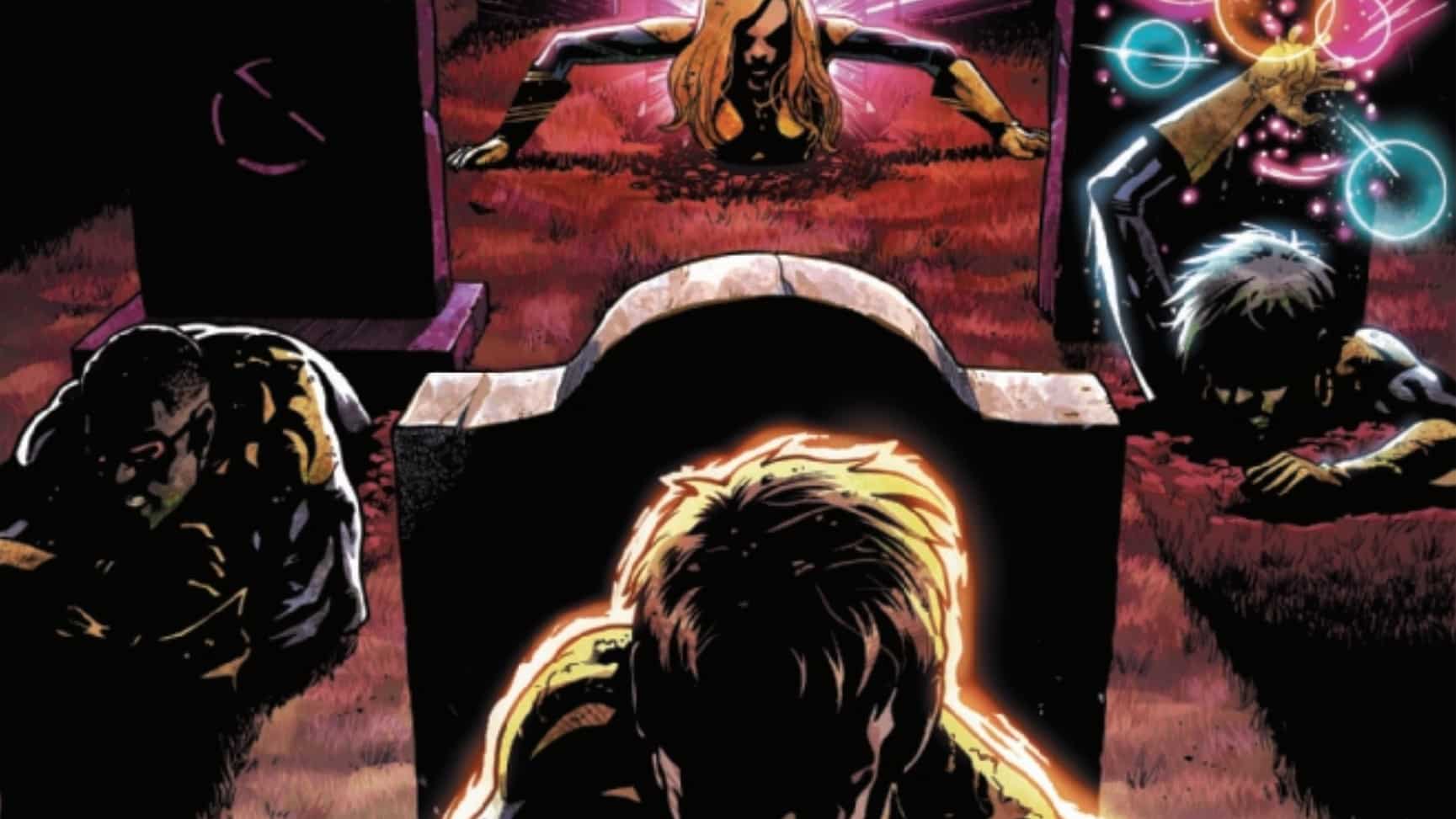Kieron Gillen, Stephanie Hans and Clayton Cowles return to the world of DIE after a six-month hiatus with the first issue of the final arc of the series, “Bleed.” Our intrepid heroes take a sea journey to try to reach the center of DIE and save both the game world and the real one.
Mark Turetsky: Hi Corey, I’m thrilled to be covering this title with you! Do you have much experience with TTRPGs?
Corey Smith: Hey Mark, glad to be here! I’ve played the occasional session, but nothing that’s lasted for long — most of my experience is in watching other people play, or reading rulebooks.
MT: A fine tradition all its own! That was my experience as a kid, but for most of my adult life I’ve been involved in long-running D&D campaigns, along with a smattering of other games here and there.
Also, some friends of mine host an annual private “con” where we all play one-shot adventures of a more experimental nature. Which is why I’ve latched onto DIE so thoroughly (though its creative team is certainly a big selling point, too).
CS: That definitely sounds like a good time! I’m with you on the creative team as a selling point — everyone involved does amazing work, and I’ve missed them in the break between arcs.
You’re Probably Wondering How We Got on This Boat…

MT: And it seems like our characters have been up to stuff in the hiatus! Instead of starting right where we left off, there’s a bit of a time jump, and a couple of pages filling us in on all the big plot stuff that happened between the two arcs. I love the very flat, storybook-like art and muted colors that Hans uses in the recap pages.
CS: Likewise! With the shift to a new arc, and as the story points out, a new genre, there are subtle shifts to the way the whole thing is portrayed, from the art to the narration itself. Even with that evolution, it’s still fundamentally, uncomfortably DIE, and perfectly encompasses why this team is so strong.
MT: There’s a moment in the recap page that I want to touch on, that tells you just how careful Gillen is as a writer. When Augustus threatens Ash if she ever returns, Ash’s caption reads, “I am a disappointment. And he is not.”
It’s a lovely callback to issue #14, when Augustus has returned to Ash after being injured at the front, and Ash’s captions read, “My heart swells. Not a disappointment. Not a disappointment. Not a disappointment.” Between those two moments, it’s such a great encapsulation of, a) taking parental pride and b) feeling like an absolute fuckup as a person at the same time.
CS: You’re absolutely right — it’s funny, one of the moments from Wicked + the Divine that stuck with me for years was when Gillen nodded to This Be the Verse, with that ever classic “They’ll fuck you up, your mum and dad.” With how much WicDiv and Young Avengers had an undercurrent of the effect our parents have on us, it was fascinating to see that perspective flipped with Ash. I’m not sure if it’s because I’m a parent myself now, or just how much Gillen’s work stuck with me as a kid, but Ash’s response to Augustus over the past few issues, and especially this one, really resonated with me. It’s also an interesting mirror to Angela’s struggles with her daughter — both siblings have failed their children in horrifying ways over the course of the story.
MT: I’ve just been trying to put my 3-year-old to bed, and I can identify so much with Angela; to have a kid who’s not in their right mind and definitely trying to kill you if you let your guard down.
CS: God, I feel that. Mine has decided to start waking up an hour before we need to, and there are definitely times it feels like he’s going right for the throat. How do you feel about the genre shift, especially this late in the game?
MT: The shift to Lovecraftian horror? I think, if you’re looking at the whole comic as an exploration of (some of) the major influences on role playing games reflected in the progress of the story, it makes a lot of sense.
Also, it’s easy in a D&D-style setting to strut into a dungeon like a gang of gods (which our “heroes” basically are). It makes for fun roleplay, but not necessarily for great reading. But with a Call of Cthulhu-style tone shift, it ups the stakes. It’s no longer just saving the world, it’s holding onto your mind.
Our Toxic Besties

CS: Lord knows the party’s going to need some help with that — it’s notable that the gang is back together, but ultimately far more shattered than they’ve ever been. Everyone’s been through some serious crap, and the cracks are readily apparent.
MT: None more than Ash and Sol. Their interplay is really one of the more fascinating dynamics in the series. They’ve both fallen very far (Sol from presumed Grandmasterhood and Ash from Queendom), and they’re just two wretched people now. But there’s this constant reminder that Sol is still truly just a teenager. He didn’t get the adulthood that the other characters had. He’s still reminiscing about underage drinking and the glory days of teenagerhood.
CS: It’s fascinating to me to see how even if Sol himself hasn’t changed much over the course of the series, our understanding of him has. While he’s been a pitiable character from the start, this issue really hammered in just how true that is. Gone is the active menace, or the mysteriousness, it’s clear now that he largely is just trapped as a kid, and as patently in over his head as the rest of them. While he’s still not exactly trusted by the others, as well he shouldn’t be, there was clearly no more animosity directed toward him this time around than there is between any other given members of the group. Sol appears to be well and truly back in the party as of this issue, for as much as he ever could have left it before, and I feel it’s the perfect time for it, now that the book appears to be shifting into cosmic horror.
MT: He’s completely at the mercy of sinister urges, but when he’s in control, he’s capable of being thoughtful and sweet, so … yeah, he’s a teenager. It’s also interesting to me that the inhabitants of the village that they meet are so interested in him. They’re not interested in Molly, the other Fallen member of the party, so there must be something about Sol himself that they can sense. Maybe it’s because they can sense that in the real world he was an ur-gamer, a dungeon master/game master/keeper of forgotten lore, or whatever your game system calls the person who runs the adventure.
CS: That would definitely be in keeping with what we’ve seen of DIE itself, especially with the added context of how it affected Wells. The game more than abuses creatives, and while Sol isn’t in a position to create at the moment, it’s a clear sign that the world isn’t done with him yet. He is, for all intents and purposes, a player again now, with all of the soul-wrenching bullshit that comes with that.
MT: What did you make of the village itself?
CS: It was impressively unsettling. I’m about to lose most of my nerd cred here, but for as much as I enjoy Lovecraft-inspired works, I’ve never had any inclination to explore anything from the man himself — I’ve always been too much like his cat, if you get my drift. Still, from what I understand, the village did a very good job of capturing the best parts of his aesthetic: Throughout the issue the creeping sense of unease was palpable, and managed to feel inevitable without feeling cliched. Of course there were ritual sacrifices, there never could have been anything else. How about you?
MT: So it’s a pretty direct lift of the novella The Shadow Over Innsmouth. Basically, guy visits mysterious run-down village in New England, notices all of the people are weird fish-people (which Hans really nails in her renderings of them), has to spend the night, manages to escape with his life and a much-bruised sense of sanity. It’s pretty much the classic Lovecraft story.
What’s great about this incarnation of it is the words the villagers use in their rituals: They repeat “THACO AC, THACO CHA, THACO STR” which are references to Armor Class, CHArisma, STRength and the like, with THACO (or more accurately “THAC0” with a zero), which is an outdated term from early D&D (To Hit Armor Class Zero has been replaced with attack bonus since Third Edition).
So they have some notion of the secret rules that govern their universe, but maybe don’t have quite a good grasp on it, and they’ve glommed onto a bit of forgotten and discarded lore. THAC0 is the old and forgotten practice that only the oldest and wisest practitioners even know about. And the final moments of the sacrifice, “THACO SAN!” refers to a player’s SANity score, which is not from D&D but from the Call of Cthulhu roleplaying game, where your player character’s sanity is in limited supply and constantly under attack. If it wasn’t clear that Gillen and Hans were riffing on Lovecraft before this point, that’s another red flag.
CS: That’s a good catch — I recognized the more common stat abbreviations, but I’ll admit I was thrown for a loop with the THAC0, and it took an embarrassingly long time for me to figure out “SAN.” DIE is one of those books that always manages to make me feel a little guilty if I haven’t done the course reading, and I wouldn’t be surprised if this arc is what finally gets me to look into Lovecraft proper.
MT: Personally, Call of Cthulhu, the TTRPG, is a lot more fun than reading Lovecraft. I try to get in a session with friends whenever I can, but it’s not nearly as popular as D&D, and can be a lot more intense.
CS: I can imagine — it’s hard enough getting people to be available for something they already know they enjoy, let alone a game that asks as much of them as Call of Cthulhu. As someone more experienced with that system, are there any ways you think this final arc will (or should!) draw from it?
MT: So. Are you familiar with the term TPK? It stands for Total Party Kill, and it happens a lot more frequently in Call of Cthulhu than in D&D. CoC has the players roleplaying as regular squishy people. You don’t learn spells or pick up superpowers. You just go up against horrible things from beyond imagining and hope you come out OK. I’ve had many of my characters die. I’ve found myself murdering other player characters. It’s a really brutal game, and it should have us all worried about the fates of our “intrepid” “heroes.”
CS: Especially considering how brutal things have been already! Honestly, there’s a very real part of me that’s expecting that — we already know Chuck’s survival isn’t among the things that happen, for example, and I’d be surprised to see Sol make it back to Earth unscathed. Angela’s already shown willingness to sacrifice herself so that her daughter can live, of course, and Matt’s walking on unprecedented ground after picking up a second psychic shithead sword. Pretty much everyone in the book wants Ash’s head, of course, for often justifiable reasons. Isabelle’s work with transactional gods is worrying as well. There are a lot of things that could go wrong, and I’ll be shocked if a lot of them don’t. That being said, Mark, have you had the opportunity to take a look at the actual DIE game?
MT: I have! I checked it out when Gillen put out the earliest rules set. I haven’t kept up with the revisions, as I haven’t had any opportunity to play, and I’m not entirely interested in reading sets of revisions. But it was interesting how that early one-shot adventure mode seemed designed to re-create the first arc of the comic. Like, you could look at how Gillen sets up emotional conflict within the game, and then tie it to something like Isabelle having to read her high school diary to a congregation of people. I’ve also watched a few videos of live play sessions, and it looks like it can be a really enjoyable game.
CS: I’m in roughly the same boat — I took a look when it was first posted, stopped for fear of ruining things for myself, and have only vaguely been keeping up. That said, I took another look late last year — I actually took a break from the comic around issue #12, because even if the comic itself hadn’t gotten much darker … well, July of 2020. I was at my limit for darkness. But I did find myself taking another look at the rules, with the added context of the issues that had come out since the first update, and a deeper understanding of the story so far. I realize that any guesses as to what will happen next probably won’t come close, especially now that we’re nearing the endgame, but do you think you gained any useful input from the rules?
MT: Not really. I don’t think Gillen would reveal much about the greater workings of the world of DIE in the game rule set. But it does give a much richer understanding of just how the characters’ powers work. While it’s explained in the text of the comic, certain concepts are much more thoroughly laid out in the game rules. Then again, I suppose with a close enough reading of the rules, one could have figured out that emotion knights could be powered by two emotions, since the emotional color wheel does contain intermediary emotions between “pure” ones.
CS: That’s fair — they’re definitely more about running your own game than remaking this one, which is a point in their favor. The one thing I’ve been looking at, if we head back to Sol for a minute, is The Master’s ability to outright cheat if they know an event is happening. With everything we’ve seen, the core of that sweet kid, do you think he’s on the up and up at this point, or will he still be an underlying threat?
MT: I’m really curious about this new ability he seems to have gained where he spouts worldbuilding exposition that he shouldn’t otherwise know. On the one hand, I wouldn’t put it past Gillen to pull a “the big bad was with us all along,” but on the other, I have trouble reconciling it with teenage Sol putting all of this together so many years ago. I don’t think we’ve yet met the intelligence behind DIE, but I think we will really soon (there are only four issues left in the series, for a start).
CS: That’s a very good point — I assume we’re not going to be seeing a DIE Holiday Special after the ending, where everyone’s brought back into the game three years later, so if we’re going to get the big answers, we’ll be getting them soon. The exposition honestly has me suspicious, though. It’s easy enough to fake having knowledge you shouldn’t, if you knew it all along, and he had decades to prepare. I’m at a point now, and I think it’s a testament to Gillen’s writing, where I’m not sure what I think is most likely to happen next, but no matter what does, I’m going to end up kicking myself for missing it!
MT: Well, our gang has just entered the nose of a giant underwater H.P. Lovecraft, slumbering like Cthulhu, and met a mutilated guide named Howard inside. What could possibly go wrong?
Random Throws of the DIE:
- The title of the arc, “Bleed,” is a TTRPG term meaning one’s own personality “bleeding” into the character you’re playing. Emily VanDerWerff wrote a great essay on bleed and playing the DIE RPG.
- Delighted and the unseen crew of the ship are such archetypal NPCs. If you ever ask your game master about a specific NPC, then they have to come up with a name, and it becomes a whole thing where they have to keep track of them and they follow you around. Better to just leave them unseen and unnamed.
- It’s appropriate that we get a grand sea voyage when we move between the European masters of DIE to our first American master.
- It’s immensely reassuring, between the dialogue and the essay at the end, to know that Gillen might respect Lovecraft’s … er, craft, but has no love for the man himself.
- On that note, if you haven’t been reading the essays, you definitely owe it to yourself to go back and give them a look!
- For more on the good, the bad and the ugly of Lovecraft, check out Will Nevin and Justin Partridge’s coverage of AfterShock’s Miskatonic.

